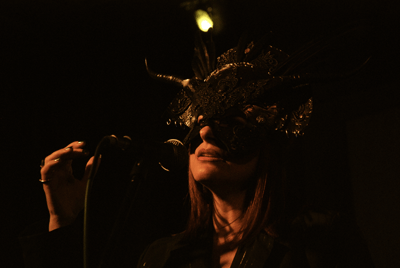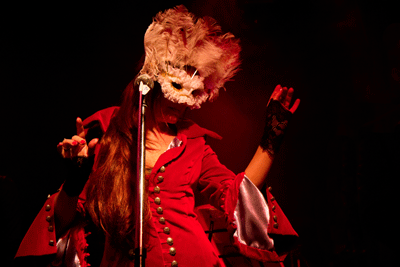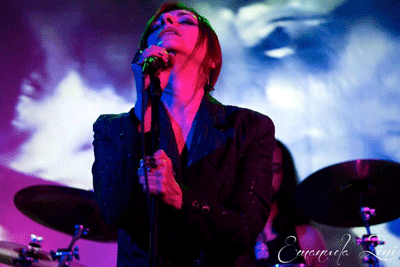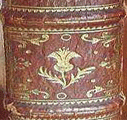| |
INTERVIEW WITH DANIELA BEDESKI |

Daniela Bedeski with RosaRubea @ The Theatre Club, Milan, 23.06.2013;C Stefano De Lorenzo
Daniela Bedeski is the former lead soprano singer of the Italian ensemble "Camerata Mediolanense", which performs neoclassical music. She is also the founder of the musical project "RosaRubea" and collaborates with several side groups. She lives in Milano with two Persian cats. In exclusive interview with Editor of the "Spiritual Development" web site she explains her artistic purposes and experience.
A. Can you tell us something about your childhood, when you started to listen to music.and sing?
D. I was a very shy child; I used to feel as if there was a sort of veil between myself and reality and I was suffering because of this. But, indeed, the world of sounds and Imagination represented true reality for me, a meaningful one, where Love and sharing could be felt with joy and no fear and I was free to go anywhere with no boundaries.
I was captured by music very early in my childhood: as soon as I put my parents' records on the record player I was carried into another world; I always tried to reproduce the sounds I heard, I wanted to feel one with the music and the singer I was listening to. Italian singers of the '60s and the '70s were my first source of inspiration. Singing represented my connection to the world. As a child, I used to go to summer colonies, which I hated at first but which helped me shape my character; I was put on the microphone during the shows in the big hall: those were my first stage experiences.
A. You had high formal, but not musical education, tell us something about that kind of experience and how much you consider that it is important for you?
D. I graduated in Foreign Languages and Literatures, that's true. But I have also studied music and singing for many years now. I have studied Opera specializing in the Baroque repertoire with Antonella Gianese and Claudine Ansermet and followed master classes with Roberto Gini, Lavinia Bertotti and Gloria Banditelli.
Studying singing gives you a wider awareness of your means and helps you to use them. Technique without Heart and Art without Nature, though, are quite poor in themselves. That is also what Culture and Breeding should give you: a wider awareness of the world and yourself.
A. What kind of relationship do you have with Italian Medieval, Classical and Folk music?
D. I like Music in itself, so I do not confine my listening to few specific genres, even if I have my favorite sounds.
Anyway, it happened that the first group I started singing with was an ancient music ensemble; with Les Nouveaux Trouveres - that was its name - we even recorded a CD, "Jubelo del Core", in 1998: here you can find an early version of "Salve, Mundi Domine, Caesar Noster, Ave", that I later proposed to execute with Camerata Mediolanense, together with "L'Homme Armé" and other ancient or folk songs.
Later, I took part in a couple of seminars led by the famous Italian ancient music ensemble La Réverdie at the beautiful International Ancient Music Course in Urbino, Italy: here the atmosphere is really magical, for musicians from all over the world gather in Federico da Montefeltro's "Citta Ideale" with their ancient instruments to play in marvelous Renaissance courts and the streets are full of minstrels and people dancing at night at the sound of ancient music and rhythms.
I used to listen to some folk music as an adolescent with my father in his country house, so he inspired that passion to me. We used to sing "Lili Marleen" and "Podmoskovnye Vecera" under the snow.
As for classical music, I started to cherish it later in my life and I appreciated it more when I began singing Opera.
Kada se radi o klasičnoj muzici počela sam da je izvodim kasnije i da je poštujem kada sam počela da pevam operske arije.
Daniela Bedeski with RosaRubea @ The Theatre Club, Milan, 23.06.2013;C Stefano De Lorenzo
A. Next question is about your collaboration with Camerata Mediolanense,: when and how did it start?
D. The collaboration with Camerata Mediolanense started in 1995. Elena and Manuel were old friends of mine, with whom I had shared quite a lot of experiences: music, travels, literature. That summer I gave a birthday party, I hadn't seen them for a few years; they told me they had gathered a band and they were looking for a singer. They asked me if I wanted to join. I listened to their music and was fascinated by its unusual charm with either a nostalgic or an epic aura, and so I answered "With pleasure!" I felt that was challenging for me. Next year, we recorded "Campo di Marte"; I hadn't taken a single singing lesson at that time. That's how I became their lead vocalist, interpreting with passion for nearly twenty years now Elena Previdi's songs or proposing myself a repertoire that we rearranged as Camerata Mediolanense: Lili Marleen, Podmoskovnye Vecera, La Guillotine, L'Homme armé, Salve, Mundi Domine were all songs remindful of a significant past and which fitted CM's mood and intents.
A. It seems that second war song "Lili Marleen" has a special meaning for you.some kind of family case?
Do you know that this song was made popular because Radio Belgrade started broadcasting this record in 1941?
D. "Lili Marleen" is a song rich with reminiscences of a melancholic past of love and war. I feel it fits me. It also reminds me of my beloved father, who first sang it to me: he used to sing it in the Italian version, when I went and visit him in his country house in winter nights; I remember with much pleasure and affection those nights in the house heated by the stove, the snow outside, my father singing and lighting his pipe, the scent of tobacco in the air mingling with the nostalgic notes of "Lili Marleen" or "Podmoskovnye Vecera". All this had a kind of magic for me, that I will never forget. And it gave me the sense of a tragic past which had hidden treasures in it, a sense of inner melancholic beauty in the midst of tragedy: the longing for love, deep feelings and emotions. The "Lili Marleen" version in the homonymous Fassbinder film also struck me. Yes, I know it was broadcasted uninterruptedly for over a year, I think, by Radio Belgrade in wartime and listened and sang by all armies all over the world.
A. How much music and art of the Renaissance and the Baroque is related to you and your music?
D. I have a more direct and deeper experience with Baroque rather than with Renaissance music. I like both, though.
English music of the Elizabethan age captures me; in fact, I love singing John Dowland's or Anne Boleyn's melancholic songs and Thomas Morley's duets. That was a brilliant period for English music and art in general.
As for the Baroque, of course, the Italians are masters here: Frescobaldi, Caccini, Barbara Strozzi, Monteverdi, Stradella, Alessandro and Domenico Scarlatti, Vivaldi, I adore all of them! I sang such a repertoire live with Camerata Sforzesca, for example, and we even recorded some beautiful songs in a church in the North of Italy long ago, which I hope will be published.
With RosaRubea, we composed a song inspired by the Medieval Anonymous Scottish ballad "The Twa Corbies", which is part of the concept EP "The Fire and The Rose", or Birth-Death-Rebirth through the four elements; "The Twa Corbies" represents here death and rebirth through the Earth.
Apart from this, though, neither Renaissance nor Baroque music or art are much related to the music I am writing myself now.
A. How much are European and Italian history and chivalrous tradition important and related to your artistic expression and, perhaps, way of living?
D. I was grown up in a big, fretful city in the North of Italy, Milan, where I still live. The school of life has been hard here; as a child and an adolescent I hated what I perceived as a grey, sad, stressful town. I liked it when I could flee from it to the countryside or the seaside. But later my relationship with my town changed, as I found my way in it and discovered the hidden beauty of a town of the north, with a stratified history and built by its hard-working citizens. Now it is still changing, in some respects not for the better. Growing up in such a hard town can fortify your character, if you have a strong personality, otherwise it can kill you.
So, to answer your question concerning European and Italian past, I wouldsay you cannot really breathe it in such a city nowadays. Personally, I rather feel the need to have an inner life of my own, free in my spirit, and to roam in space and time as I please.
I think deeper links with Nature should be sought and seen as an opportunity of evolution for mankind.
As for my artistic expression, its sources are manifold.
A. What is your opinion of Italian groups and artists like Ataraxia, Autumna et sa Rose, Argine, Francesco Banchini-Gorr, Luigi Rubino, Corde Oblique,...Do you believe there is a kind of movement in Italian and not only Italian contemporary music?
D. I personally know and am in good terms with some of them. I couldn't say whether you can call this "an Italian movement" but there is certainly an Italian taste which is quite refined, I think.
A. What kind of contemporary music do you like most, what are your favorite artists?
D. Here again I feel totally free and independent. I like all music that stirs my soul and is able of carrying me away into the world of the Unknown. Some sound-track composers capture me: the Polish Zbigniew Preisner, the British Jocelyn Pook and Michael Nyman, the Italians Ennio Morricone, Pino Donaggio and the De Angeli brothers, the French Yann Tiersen are a few examples. I like music with a wide breath, such as the one by Sigur Ros and the "Iceland wave" or Dead Can Dance; I like the dark mood and the lyricism of Philip Glass or Nick Cave, the dreamy world of Kate Bush or the flaming one of Tori Amos, the pathos and nostalgia in Anthony's voice. But also psychedelia and the New York Wave of the '70s. I like experimental music and the use of electronics blended with classical instruments.

Daniela Bedeski with Camerata Mediolanense in Mannheim, 2012; C Emanuela Zini
A. Can you tell us something about your image, do you like masquerade kind of appearance .?
D. Mine is a Public Image Limited. I like being on stage because there I can meet my multiple selves, I can become myself. Wearing a mask means playing, becoming a new Spirit. When you play on stage you represent a Ritual. I like wearing masks because they are facets of my heart and archetypes. But then I also like to take off the Mask.
A. Camerata Sforzesca is also a special project with certain aims, can you tell us more about this?
D. Camerata Sforzesca was born in 2001 as a side-project of Camerata Mediolanense to propose the music of the Renaissance and the Baroque to a non-specialist audience under the guidance of Elena Previdi and with a rich repertoire that I largely brought myself as a singer. With Camerata Mediolanense it probably shares a taste for Beauty and an awareness of the Italian and European past. With Camerata Sforzesca, we always played in places of historical interest which fitted the atmosphere suggested by the music.
A. And what about Dame Mediolanensi?
D. Dame Mediolanensi was also a side-project of Camerata Mediolanense: we used to call it "The feminine hearts of Camerata Mediolanense", since, in fact, it was founded by us, the women playing and singing in Camerata Mediolanense (apart from myself, Elena, Luminitza and Annamaria Cristian, the cellist). We did a few concerts with this ensemble, presenting a miscellaneous repertoire centered on modern music (CM's songs), German songs of the '30s and the '40s, folk songs of the Balkan area. Here again, as a singer, I was largely responsible for the repertoire proposed.
A. What is your relationship with esoteric issues, do you believe in karma and possibility that all creations and life are based on past life's knowledge and experience?
D. I believe human life is just par of Life, which is bigger than all of us and deeper and impossible to apprehend with mere reason or usual means. I believe we are nearer Life itself when we less suspect it and reach a deeper and higher awareness, which often comes through the Unexpected and then has to be cultivated with Love, Patience, Wisdom. I surely believe Life does not end with individual life, but that it transforms itself: we are energy. Karma is an interesting concept which relates human life and destiny with that of all other creatures. I like it and I believe that its spiritual intrinsic value is very high.
A. RosaRubea is your side-project with several collaborators, what kind of artistic capacity do you want to express in RosaRubea?
D. RosaRubea is the alchemical Rubedo, the ultimate phase of the "Opus Magnum" or "Opus Chemicum", announcing the transmutation of vile metal into Gold. Alchemy is a metaphor of Life both in its concrete and in its spiritual sense; it shows human beings the path towards spiritual evolution and knowledge of the inner self.
The ensemble RosaRubea wants to explore the territories of the Unknown through Music, Art, Ritual. It wants to get to the core of Life. On stage, we want it to be so. But also in the studio experience. RosaRubea's music is research, both in experimenting with electronics and in the use of classical or modern instruments.
It was founded by Pino Carafa, electronic music composer, and myself around 2009; soon joined the band other musicians at the piano (Marco Bosio), the cello (Zeno Gabaglio), the drums (Michele Fiore), the keyboards and samplers (Yann Turrini ) and the electric guitar (Ermanno Fabbri). RosaRubea is a multimedial open ensemble. We know where we start form, we do not know where we get. The Path is the most interesting part of it, the process of Creation.
A. Can you tell us something about RosaRubea's album "TRE ERT TRE", Live at Villa Festival 2012?
D. "TRE ERT TRE" is three times three: its double cover show three crosses on a red background and three women, their wrists tied; inside, three red roses are fastened to a microphone: images of suffering, of pleasure, of rebirth. Its nine tracks are taken from RosaRubea's performance at the Villa festival 2012, in Monte del Lago (PG), Italy, an enchanted medieval village on Lake Trasimeno. Most of them are live versions of RosaRubea's tracks contained in "The Fire and The Rose", RosaRubea's debut concept EP on Birth-Death-Rebirth through the four elements of Earth, Water, Air and Fire. Besides, it contains one unreleased track and two covers (Jefferson Airplane and Patti Smith). It was an homage to the Spirit of the Lake and to Music which had inspired us.
A. It seems that non-commercial musician like You must have regular work and therefore music is a kind of hobby, not a profession?
D. I do not consider music as a hobby but rather as a passion I couldn't live without. If a musician does not produce commercial music, it is hard for him to survive in a society based on consumerism, since music is seen as belonging to the luxury, and not the essential, goods. The masses let themselves be led, they let their tastes be influenced; music is not an exception in this respect. If music is a passion, though, it is essential to you just as the air you breathe. It is a way of life. Choosing to have a regular job gives you stability in life: that is what I have done, and what other non-commercial artists have also chosen - or rather have been compelled - to do.
A. Can you share some impressions about last RosaRubea's gig with Blood Axis in Milano?
D. I can say with much pleasure that this last RosaRubea's concert at "The Theatre" in Milan - stage that we shared with Blood Axis and Roma Amor - on June 23rd 2013 - has been thoroughly satisfactory. After spending a pleasant afternoon amiably talking with Annabel and Michael of Blood Axis, our performance as RosaRubea has been intense, deeply felt, the audience was captured, I sensed a hot atmosphere, a leaven to our performance. This time we had brought our sound engineer Francesco with us, who was of great help, so the sound was good and balanced. We are looking forward to playing live soon and with new material ready!

Daniela Bedeski with RosaRubea @The Theatre Club, Milan, 23.06.2013; C Emanuela Zini
Intervju sa Danielom Bedeski
|
|







